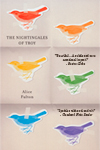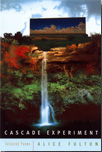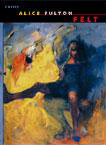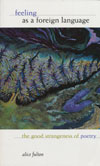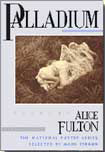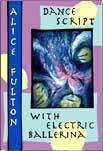

Follow Alice Fulton on Twitter
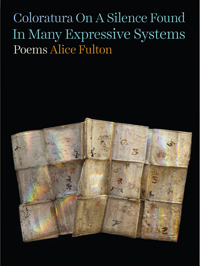
Coloratura On A Silence Found In Many Expressive Systems (W.W. Norton, 2022).

Barely Composed (W.W. Norton, 2015)

The Library of Congress
Bobbitt Prize Statement for Felt
“Full of animated, charged poems, Alice Fulton’s latest collection sizzles with logophilia and tropes, is blessed with the kind of direct wiring between sensation and language, feeling and form, that strikes first with physical and then with intellectual and emotional wallop. Hers is a poetic sensibility at once remarkably comprehensive and remarkably precise, and felt; her best book so far is possessed of great velocity, great staying-power.”
— David Baker, Eamon Grennan, and Heather McHugh
![]()
Poetry Anthologies and Reprints
The Best of the Best American Poetry: 25th Anniversary Edition, Robert Pinsky, ed., Scribner, New York, 2013.
The Penguin Anthology of Twentieth-Century American Poetry, Rita Dove, ed. (Viking Penguin, New York, 2011).
The Open Door: 100 Poems, 100 Years of Poetry Magazine, Don Share and Christian Wiman, eds., (University of Chicago Press, 2012).
Alhambra Poetry Calendar 2013, Shafiq Naz, ed. (Alhambra Publishing: Bertem, Belgium) November 2012.
Alhambra Poetry Calendar for Young Readers 2013, Shafiq Naz, ed., (Alhambra Publishing: Bertem, Belgium) November 2012. “Your Card Read Poet Mechanic.”
The Kennedy Collection, Joe Kennedy and Dana Gioia, eds., (Pearson Education, 2012).
Contemporary American Poems: A Chinese-American Bilingual Anthology, (People’s Literature Publishing House, Beijing, China, 2011) Chinese/English trans. by Aaron Crippen.
Anthology for PCL Intro to Literature, X.J. Kennedy and Dana Gioia, eds., (Pearson Learning Solutions, Boston, 2011).
When Love Speaks: Poetry and Prose for Weddings, Relationships and Married Life, Adam O’Riordan, ed. (Vintage Classics, London, 2011).
American Hybrid: A Norton Anthology of Contemporary Poetry, David St. John and Cole Swenson, eds. (W.W. Norton, New York, 2009).
Women's Work: Modern Women Poets Writing in English, Amy Wack and Eva Salzman, eds. (Seren, Wales, 2009).
Contemporary American Poetry: An Urdu-English Bilingual Anthology, Fakhar Zaman and Kevin Prufer, eds. (Pakistan Academy of Letters, Islamabad, 2009).
Backpack Literature: An Introduction to Fiction, Poetry, Drama, and Writing, Dana Gioia and X.J. Kennedy, eds. (Longman, 2009).
Alhambra Poetry Calendar 2010, Shafiq Naz, ed. (Alhambra Publishing: Bertem, Belgium) September 2009.
Contemporary Poetry in the United States: A Russian-English Bilingual Anthology, April Lindner and Dana Gioia, eds. (OGI Press, Moscow, 2008).
Quote Poet Unquote: Contemporary Quotations on Poets and Poetry, Dennis O'Driscoll, ed. (Copper Canyon Press, Port Townsend, 2008).
Alhambra Poetry Calendar 2008: 366 Classic and Contemporary Poems, Shafiq Naz, ed. (Alhambra Publishing, Bertem Belgium, 2008).
Alhambra Poetry Calendar 2008 (The Book): 366 Classic and Contemporary Poems, Shafiq Naz, ed. (Alhambra Publishing, Bertem Belgium, 2008).
Poetry Calendar 2007 Anthology: 365 Classic and Contemporary Poems, Shafiq Naz, ed. (Alhambra Publishing, Bertem Belgium, 2007).
Third Rail: An Anthology of Poetry about Rock & Roll, Jonathan Wells, ed. (MTV Books/Pocket Books, New York, 2007).
The Pushcart Book of Poetry: The Best Poems from the First 30 Years of the Pushcart Prize, Joan Murray, ed. (Pushcart Press, Wainscott, N.Y., 2006).
Innovative Women Poets: An Anthology of Contemporary Poetry and Interviews, Elisabeth Frost and Cynthia Hogue, eds. (University of Iowa Press, Iowa City, 2006).
Twentieth-Century American Poetry, Dana Gioia, David Mason, and Meg Schoerke, eds. (McGraw-Hill, New York, 2004).
Poetry Daily: 366 Poems from the World’s Most Popular Poetry Website, Diane Boller, Don Selby, and Chryss Yost, eds. (Sourcebooks, 2003).
The Poetry Anthology 1912-2002, Joseph Parisi, ed. (Ivan R. Dee, Chicago, 2002).
250 Poems: A Portable Anthology, Peter Schakel and Jack Ridl, eds. (St. Martin’s, New York, 2002).
Literature: An Introduction to Fiction, Poetry, and Drama, 8th ed., X.J. Kennedy and Dana Gioia, eds. (Longman, 2002).
The Extraordinary Tide: New Poetry by American Women, Susan Aizenberg and Erin Belieu, eds. (Columbia University Press, New York, 2001).
Poets of the New Century, Roger Weingarten and Richard M. Higgerson, eds. (David R. Godine, Jaffrey, New Hampshire, 2001).
Flora Poetica: The Chatto Book of Botanical Verse, Sarah Maguire, ed. (Chatto & Windus, Ltd., London, England, 2001).
A Fine Excess: Contemporary Literature at Play, Kirby Gann and Kristin Herbert, eds. (Sarabande Books, Louisville, 2001).
De/Compositions, W.D. Snodgrass. (Graywolf Press, St. Paul, 2001).
Storie — Pomeriggio: Dieci Minuti alle Sei, Gianluca Bassi, ed. (Leconte, Rome, Italy, 2001).
All Shook Up: Collected Poems about Elvis, Will Clemens, ed. (University of Arkansas Press, Fayetteville, 2001).
Visiting Emily: Poems Inspired by the Life and Work of Emily Dickinson, Sheila Coghill and Thom Tammaro, eds. (University of Iowa Press, Iowa City, 2000).
The Huron River: Voices from the Watershed, John Knott and Keith Taylor, eds. (University of Michigan Press, Ann Arbor, 2000).
New Poems from the Third Coast, Michael Delp, Conrad Hilberry, and Josie Kearns, eds. (Waynes State University Press, Detroit, 2000).
Introspections: American Poets on One of Their Poems, Robert Pack and Jay Parini, eds. (University Press of New England, 1997).
The Best of the Best American Poetry, 1988-1997, Harold Bloom, ed. (Scribner, New York, 1998).
Roth’s American Poetry Annual 1997 CD-ROM (Roth Publishing, Great Neck, N.Y., 1997).
Many Lights in Many Windows: Twenty Years of Great Fiction and Poetry from the Writers Community, Laurel Blossom, ed. (Milkweed Editions, 1997).
Literature: An Introduction to Fiction, Poetry, and Drama, Compact Edition, X.J. Kennedy and Dana Gioia, eds. (HarperCollins, New York, forthcoming).
A Visit to the Gallery, Richard Tillinghast, ed. (University of Michigan Press, Ann Arbor, 1997).
Approaching Poetry, Peter Schakel and Jack Ridl, eds. (St. Martin’s, New York, 1997).
Emergency Kit: Poems for Strange Times, Jo Shapcott and Matthew Sweeney, eds. (Faber & Faber, London, 1996).
Ecstatic Occasions, Expedient Forms: Leading Contemporary Poets Select and Comment on Their Poems, revised edition, David Lehman, ed. (University of Michigan Press, 1996).
Writing Poems, fourth edition, Robert Wallace and Michelle Boisseau, eds. (HarperCollins, New York, 1996).
A Year in Verse, Thomas Foster and Elizabeth Clark Guthrie, eds. (Crown Publishing Group, New York, 1995).
Wherever Home Begins, Paul Janeczko, ed. (Orchard Books, New York, 1995).
I Will Breathe a Mountain: A Song Cycle from American Women Poets, William Bolcom, composer (Edward B. Marks Music Company, New York, 1995).
For a Living: The Poetry of Work, Nicholas Coles and Peter Oresick eds. (University of Illinois Press, Champaign, 1995), pp. 162-167.
Literature: An Introduction to Fiction, Poetry, and Drama, 6th ed., X.J. Kennedy and Dana Gioia, eds. (HarperCollins, New York, 1995).
Articulations: The Body and Illness in Poetry, John Mukand, ed., (Iowa, Iowa City, 1994).
After Ovid: New Metamorphoses, Michael Hofmann and James Lasdun, eds. (Farrar, Straus & Giroux, New York, 1995 and London 1994).
An Introduction to Poetry, 8th ed., X.J. Kennedy and Dana Gioia, eds. (HarperCollins, New York, 1994).
The Best American Poetry, 1994, A.R. Ammons, ed. (Collier Macmillan, New York, 1994).
Walk on the Wild Side:Urban American Poetry Since 1975, Nicholas Christopher, ed. (Collier Books, New York, 1994).
Cape Discovery: The Provincetown Fine Arts Work Center Anthology,
Bruce Smith and Catherine Gammon, eds. (Sheep Meadow Press, Riverdale-on-Hudson, N.Y., 1994).
The Pushcart Prize XVIII: Best of the Small Presses, 1993-1994, Bill Henderson, ed. (Pushcart Press, Wainscott, N.Y., 1993).
Modern American Poets, 2d ed., Robert DiYanni, ed. (McGraw-Hill, New York, 1993).
Literature in English: Writers and Styles from Anglo-Saxon Times to the Present (Prentice-Hall Canada Inc., Scarborough, Ontario, 1993).
The McGraw-Hill Book of Poetry, Robert DiYanni and Kraft Rompf, eds. (McGraw-Hill, New York, 1993).
Literature for Composition, Sven Birkerts (Allyn & Bacon, Boston, 1993).
Looking for Your Name, Paul Janeczko, ed. (Orchard Books, New York, 1993).
Poems for a Small Planet: Contemporary American Nature Poetry, Robert Pack and Jay Parini, eds. (University Press of New England, Hanover and London, 1993).
Western Wind: An Introduction to Poetry, 3d ed., John Frederick Nims, ed. (McGraw-Hill, New York, 1992).
The Best American Poetry, 1992, Charles Simic, ed. (Collier Macmillan, New York, 1992).
Roth’s American Poetry Annual 1990 (Roth Publishing, Great Neck, N.Y., 1991).
New American Poets of the '90s, Jack Myers and Roger Weingarten, eds. (David R. Godine, Boston, 1991).
The Best American Poetry, 1991, Mark Strand, ed. (Collier Macmillan, New York, 1991).
Seasonal Performances: A Michigan Quarterly Review Reader, Laurence Goldstein, ed. (University of Michigan Press, Ann Arbor, 1991).
The Jazz Poetry Anthology, Sascha Feinstein and Yusef Komunyakaa, eds. (Indiana University Press, Bloomington, 1991).
The Best American Poetry, 1989, Donald Hall, ed. (Collier Macmillan, New York, 1989).
Arvon International Poetry Competition, 1987 Anthology, Ted Hughes and Seamus Heaney, eds. (Arvon Foundation, Devon, England, 1989).
Vital Signs: Contemporary American Poetry from the University Presses, Ronald Wallace, ed. (University of Wisconsin Press, Madison, 1989).
Roth’s American Poetry Annual 1988, H. Weintraub, ed. (Roth Publishing, Great Neck, N.Y., 1989).
The Best American Poetry, 1988, John Ashbery, ed. (Collier Macmillan, New York, 1988).
Annual Survey of American Poetry, 1986 (Roth Publishing, Great Neck, N.Y., 1987).
Contemporary Michigan Poetry: Poems from the Third Coast, Herb Scott, Michael Delp, and Jack Driscoll, eds. (Wayne State University Press, Detroit, 1988).
Ecstatic Occasions, Expedient Forms: 65 Leading Contemporary Poets Select and Comment on Their Poems, David Lehman, ed. (Macmillan, New York, 1987).
Keener Sounds: Selected Poems from The Georgia Review, Stanley W. Lindberg and Stephen Corey, eds. (University of Georgia Press, Athens, 1987).
The Ploughshares Poetry Reader, Joyce Peseroff, ed. (Ploughshares Books, Watertown, 1986).
New American Poets of the '80s, Jack Myers and Roger Weingarten, eds. (Wampeter Press, Green Harbor, Mass., 1984).
New Voices/1979-1983, May Swenson, ed. (Academy of American Poets, New York, 1984).
Sotheby’s Poetry Competition 1982 Anthology, Gwendolyn Brooks, Basil Bunting, Stephen Spender, et al., eds. (Arvon Foundation, Devon, England, 1984).
Strings: A Gathering of Family Poems, Paul Janeczko, ed. (Bradbury Press, Scarsdale, N.Y., 1984).
The Poet Dreaming in the Artist’s House (Milkweed Chronicle Press, Minneapolis, Minn., 1984).
Leaving the Bough: 50 American Poets of the Eighties, Roger Gaess, ed. (International, New York, 1982).
![]()
Fiction Anthologies and Reprints
The Best American Short Stories, 2009, Alice Sebold, guest ed., and Heidi Pitlor, series ed., (Mariner Books, Boston, 2009).
Peculiar Pilgrims: Stories from the Left Hand of God, Linda K. Wendling, ed. (Hourglass Books, 2007).
The Long Meanwhile: Stories of Arrival and Departure, Molly McQuade, ed. (Hourglass Books, 2007).
The Pushcart Prize XXIX: Best of the Small Presses, 2005, Bill Henderson, ed. (Pushcart Press, Wainscott, N.Y., 2005).
Cabbage and Bones: An Anthology of 20th-Century Irish American Women’s Fiction, Caledonia Kearns, ed., (Henry Holt & Company, New York, 1997).
Writers Harvest II, Ethan Canin, ed., (Harcourt Brace, New York, 1996).
The Best American Short Stories, 1993, Louise Erdrich, guest ed., and Katrina Kenison, annual ed., (Houghton Mifflin Company, Boston, 1993).
![]()
Nonfiction Anthologies and Collections
A Broken Thing: Contemporary Poets on the Line, Emily Rosko and Anton Vander Zee, eds. (University of Iowa Press, Iowa City, 2011)
Twentieth-Century American Poetics: Poets on the Art of Poetry, Dana Gioia, David Mason, and Meg Schoerke, eds. (McGraw-Hill, New York, 2004).
The Measured Word: On Poetry and Science, Kurt Brown, ed., (University of Georgia Press, 2001).
Green Thoughts, Green Shades: Contemporary Poets on Seventeenth-CenturyVerse, Jonathat Post, ed., (University of California Press, 2001).
Nineteenth Century Literature Criticism, volume 77, Suzanne Dewsbury, ed., (Gale, Farmington Hills, 1999).
An Exaltation of Forms, Katherine Varnes and Annie Finch, eds., (University of Michigan Press, 2001).
Introspections: American Poets on One of Their Own Poems, Robert Pack and Jay Parini, eds., (University Press of New England, 1997).
Tolstoy’s Dictaphone: Technology and the Muse, Sven Birkerts, ed., (Graywolf Press, St. Paul, Minn., 1996).
The Poet’s Notebook: Excerpts from the Notebooks of 26 American Poets, Stephen Kuusisto, Deborah Tall, and David Weiss, eds., (W.W. Norton, New York, 1995).
Literature: Reading Fiction, Poetry, Drama and the Essay, fourth edition, Robert DiYanni, ed. (McGraw-Hill, 1997).
The Bedford Introduction to Literature, fourth edition, Michael Meyer, ed. (Bedford Books, Boston, 1996).
DISCovering Authors: Poets, (Gale Research, Detroit, 1995). CD-ROM, magnetic tape, by subscription or through your library's networked resources.
Poetry: An Introduction, Michael Meyer, ed. (St. Martin’s, New York, 1995).
In a Word: A Dictionary of Neologisms, Jack Hitt, ed. (Dell Books, New York, 1992, "The Intrepid Linguist" series).
Contemporary Literary Criticism: Excerpts from Criticism of the Works of Today’s Novelists, Poets, Playwrights, Short Story Writers, Scriptwriters, and Other Creative Writers, Daniel G. Marowski and Roger Matuz, eds., (Gale Research, Detroit, 1994).
Conversant Essays: Contemporary Poets on Poetry, James McCorkle, ed. (Wayne State University Press, Detroit, 1990).
Contemporary Literary Criticism: Excerpts from Criticism of the Works of Today’s Novelists, Poets, Playwrights, Short Story Writers, Scriptwriters, and Other Creative Writers, Daniel G. Marowski and Roger Matuz, eds., (Gale Research, Detroit, 1989).
Contemporary Literary Criticism: Excerpts from Criticism of the Works of Today’s Novelists, Poets, Playwrights, Short Story Writers, Scriptwriters, and Other Creative Writers, Daniel G. Marowski and Roger Matuz, eds., (Gale Research, Detroit, 1988).
Bibliography
Poetry
Coloratura On A Silence Found In Many Expressive Systems, W.W. Norton, fall 2022.
Barely Composed, W.W. Norton, 2015.
Cascade Experiment: Selected Poems, W.W. Norton, 2004.
Felt, W.W. Norton, 2001.
Sensual Math, W.W. Norton, 1995.
Powers Of Congress, Sarabande Books reissue, 2001; Godine, 1990.
Palladium, University of Illinois Press, 1986.
Dance Script With Electric Ballerina, University of Illinois Press reissue, 1996; University of Pennsylvania Press, 1983.
Fiction
The Nightingales of Troy, W.W. Norton, July 2008.
Prose
Feeling as a Foreign Language: The Good Strangeness of Poetry, Graywolf Press, 1999.
Other
Essays on Alice Fulton’s Work
Poetry Anthologies and Reprints
Nonfiction Anthologies and Collections
Fiction Anthologies and Reprints
Audio-Libretti, Recordings
All of Alice Fulton’s books are in print and available.

Barely Composed
W.W. Norton, 2015
“Alice Fulton … can make you see the space between the stars. Fulton's poems give us access to those spaces between and beyond words, a wilderness where meaning awaits capture. There's beauty and terror to be found in such unmapped terrain, but Fulton sounds at home in the unknown, her music rising like wind whistling between all these ‘finite things.’ ”
The Boston Globe
“In Barely Composed … there is the push-pull of Fulton's yearning for tranquility and her refusal to accept a 'limited truth value.' These are not 'protest' poems. … Rather, they confront how a nation's actions tar its citizens' lives, making them complicit. Fulton's poetry repeatedly enacts this … refusal to look away, or to let the reader look away. Her emotions checked, but never extinguished, she is a master of withering sarcasm: a mode of expression that emanates from no still or tranquil place. Fulton has an ascetic saint's sensibility.… One can imagine her in a cave, staring at a flame until she goes blind, in the name of whatever god will speak to her, if only it speaks true. ”
Open Letters Monthly
full text of review online at Open Letters Monthly
The Nightingales of Troy
W.W. Norton, July 2008
“With The Nightingales of Troy: Stories of One Family’s Century, her outstanding first fiction collection, poet Alice Fulton reveals herself to be triumphantly at home in the short story. Spanning the 20th century — from a farm birth in 1908 to an MRI in 1999 — Fulton’s stories are sublime distillations, not only of the individual lives they so eloquently describe, but also of the eras throughout which the formidable Garrahan family endures.”
Anna Mundow
The Boston Globe
New & Recommended by The Boston Globe
A Discoveries feature by The Los Angeles Times
Featured Books interview by The Irish Times
Starred review by Kirkus Reviews
Starred review by Booklist
A Recommended Book by BookBrowse.com
Praised in The New York Times Book Review, The Seattle Times, Cleveland Plain Dealer, Winston-Salem Journal, and elsewhere.
Two stories from The Nightingales of Troy have been chosen for The Best American Short Stories, a third was selected for The Pushcart Prize Anthology.
Click here for photo gallery, the story behind the stories (author comment), and reading group guide.
(read all reviews and comments for The Nightingales of Troy)
Cascade Experiment: Selected Poems
W.W. Norton, 2004
“Alice Fulton is not a safe poet; she’s a daring, ambitious, and risk-taking one, and, as the magnificent pieces gathered together in Cascade Experiment so eloquently and scintillatingly demonstrate, she has been so throughout her lengthy and deservedly successful career. Time and again Fulton has proven herself willing, unlike so many of her contemporaries, to take chances in her work. Poetry as a whole would be much enlivened if poets everywhere could take a cue from her and engage in experimentation of their own.”
Kathleen Rooney
Harvard Review
(read all reviews of Cascade Experiment)
Felt
W.W. Norton, 2001
Awarded the 2002 Rebekah Johnson Bobbitt National Prize for Poetry from the Library of Congress
“In Alice Fulton’s poetry, those charged instances when the literal and the metaphysical (and the sensual and the philosophical) overlap are often mediated by wordplay — a pun, a double entendre, a witty turn of phrase. The title of her marvelous fifth collection, Felt, is meant to signify both an emotion once experienced [and] the fabric constructed by fibers that are forcibly pressed, rather than woven, together. In “Fair Use,” these two meanings fuse, so that felt represents the joyous and maddening experience of human interconnectedness — ‘a fabric of entanglement =![]() = / my consciousness felted with yours.’ ... Throughout these kinetically textured lyric poems — they have varied indentations and line lengths, and are aurally rich with slant rhymes and musical rhythms — the meanings of words shift, contort and refract (one point of creating art, as Fulton puts it, is ‘to / origami thought’). In the long poem ‘About Music for Bone and Membrane Instrument,’ written in a series of 13 sections, a Japanese fan metamorphoses into fan’s other usage — a devotee or admirer — as the loss of self shared by both a star performer and a swooning audience member is revealed. In poems obsessed with identity, yearning and intimacy, the power of Fulton’s verbal pyrotechnics is that they precisely animate these mutable, ever-changing states.”
= / my consciousness felted with yours.’ ... Throughout these kinetically textured lyric poems — they have varied indentations and line lengths, and are aurally rich with slant rhymes and musical rhythms — the meanings of words shift, contort and refract (one point of creating art, as Fulton puts it, is ‘to / origami thought’). In the long poem ‘About Music for Bone and Membrane Instrument,’ written in a series of 13 sections, a Japanese fan metamorphoses into fan’s other usage — a devotee or admirer — as the loss of self shared by both a star performer and a swooning audience member is revealed. In poems obsessed with identity, yearning and intimacy, the power of Fulton’s verbal pyrotechnics is that they precisely animate these mutable, ever-changing states.”
Megan Harlan
The New York Times Book Review
Feeling as a Foreign Language: The Good Strangeness of Poetry
Graywolf, 1999
“In this feisty and original collection of essays, the poet Alice Fulton leads us into new ways of thinking about the nature of postmodern poetry, suggesting innovations in its elastic content and form that draw on mathematical, scientific and philosophical theory. She also scrutinizes the rich legacy of such diverse female poets as Margaret Cavendish and Emily Dickinson.
Fulton’s mood in these essays is consistently experimental and subversive.... Taking dead aim at some of mainstream literary America’s complacent assumptions about the postmodern poem, she advises replacing its flat, transparent surface with a rough-edged, multi-textured work in which the surface of language does not remain static but continually shifts. Boldly imagined ... [this is] a call for nothing less than a revolution in the language of both free verse and free verse criticism.
The jewel in this collection is ‘Her Moment of Brocade,’ the finest essay I have read on Emily Dickinson since Adrienne Rich’s ‘Vesuvius at Home’ ... Here, as elsewhere in the collection, Fulton brilliantly uses scientific and philosophic theory to interpret poetic phenomena.
Feeling as a Foreign Language is a book that satisfies as it provokes ... challenging complacency at every turn. It should attract not only readers of poetry but all readers who enjoy the vigor of bold, original thought.”
Rita Signorelli-Pappas
Women’s Review of Books
(read all reviews of Feeling as a Foreign Language)
Sensual Math
W.W. Norton, 1996
“In Sensual Math, Fulton combines in deliberately unsettling — and often deliciously funny — ways a multiplicity of styles, tones, and registers linked to various genres and diverse cultural contexts, so that the reader is kept constantly aware of the play of language and never allowed to rest in the fiction of unmediated personal expression. The breaks between Fulton’s frequently enjambed lines generate puns or semantic ambiguities that further foreground the processes of language and interpretive choice....
Like the Language writers, Fulton approaches poetry as possessing larger intellectual powers and cultural responsibilites than personal expression, even though she remains comfortable, as they tend not to be, incorporating such expression into her writing....
Her inventive work, which stretches the linguistic, tonal, vocal, and emotional range of contemporary lyric, points ultimately to resources that lie between recognized categories, in liminal states, and at the cultural margins as offering hope for signigicant social and aesthetic change. Her double equal sign and other rejections of patriarchal binaries aim ... to counter the destructive othering that pervades all aspects of our lives....”
Lynn Keller
American Literature
(read all reviews of Sensual Math)
Powers Of Congress
Sarabande Books reissue, 2001
David R. Godine, 1990
“She is an ambitious, powerful poet.... Her themes — like those of her great exemplar, Dickinson — are the sacred and the profane. But instead of seeking to define the profane by the sacred, as Dickinson often can, Fulton says ... how about using the profane to point toward the sacred? In the masterful title poem, ‘Powers of Congress,’ she invites us to this paradox, detailing experiences of stress and force in the ironies of daily life.... There is a range of perspectives in her work and she deploys them well.... She is a thematic gambler of the best sort. Her poems are daring and broad.”
Eavan Boland
Partisan Review
(read all reviews of Powers Of Congress)
Palladium
University of Illinois Press, 1986
Winner of the National Poetry Series 1985 and Society of Midland Authors Award 1985
“Fulton revels in her findings, in the artisan’s sense of the the term, and the poems in Palladium are prepossessing and formidable ... her work is remarkable for its flamboyant diction, the wide range and acute particularity and vibrant color of it.... Because of Fulton’s energy and passion for specificity, there is hardly a dead line. What most of these poems testify to so energetically is the power of ‘expansion’ — the movement from some kind of constriction to some kind of freedom.... In addition to meditations and the dramatic monologues and portraits, there are compressed lyrics ... all among the best things in this very impressive volume. Fulton’s second book augurs the arrival of an exceptional poet.”
Stephen Yenser
The Yale Review
(read all reviews of Pallaidum)
Dance Script With Electric Ballerina
University of Illinois Press reissue, 1996
University of Pennsylvania Press, 1983
Winner of the Associated Writing Programs Award, 1982
“We are back in the real world, foolish, extraordinary, desirable; and articulated with poise, humour and adventure. Physical sensations are balanced against events, metaphor against recital, in a most effective way. All in all, I would situate Alice Fulton as a close verse equivalent to the new tough-and-tender realism in American fiction, many of its practitioners women, and many of them poets as well: Jayne Anne Phillips, Elizabeth Tallent, Raymond Carver, Denis Johnson. She has their loners, their freaks, their cruelty, their orientation towards low-life, and their unconventional elegance and articulateness.”
Michael Hofmann
PN Review, Manchester, UK
(read all reviews of Dance Script With Electric Ballerina)
Essays and Comments on Alice Fulton’s Work
Theresa M. DiPasquale, “‘New Alchemie’: Reading John Donne’s ‘Nocturnall’ Through Poems by Kimberly Johnson and Alice Fulton,” Connotations, vol. 30, December 2021.
Jonathan F.S. Post, “Re-gifting Some Shakespeare Sonnets of Late,” in Hannah Crawforth, Elizabeth Scott-Baumann and Clare Whitehead, eds., The Sonnets: The State of Play (Bloomsbury / The Arden Shakespeare, 2017).
Cynthia Hogue, “On the Borders between Lyric and Language Poetry: Alice Fulton.” in 20th and 21st Centuries in American Literature, edited by Mary Pat Brady. Farmington Hills, MI: Gale, 2016. Gale Researcher (accessed May 9, 2017).
Linda Gregerson, “Donne in the Twenty-first Century: Thinking Feeling,” in Michael Schoenfeldt, ed., Donne in Context, Cambridge University Press online publication (April 2019).
Jacquelyn Ardam, “Releasing Daphne: Alice Fulton, Ovid, Trees,” Contemporary Women’s Writing 7:2:1–19, July 2013.
Marysia Zalewski on "Thinking and writing below the radar," Greynog Ideas Lab, Aberdeen, Scotland, July 2012.
Curtis Fox and Catherine Halley read and discuss love poems by Alice Fulton, e.e. cummings, and Dorothea Lasky, "I Knew All Along You Were Mine," on the Poetry Foundation web site for Valentine's Day. February 3, 2012. Listen here.
Jacquelyn Ardam, “The Suckers Love a Weird Wedding: Alice Fulton, Ovid, Trees,” paper delivered at the American Comparative Literature Association annual meeting "World Literature, Comparative Literature," Vancouver, Canada, March 31–April 3, 2011.
Elline Lipkin, "The Active Blank: The White Space Speaks," in Blas Falconer, Beth Martinelli, and Helena Mesa, eds., Mentor and Muse: Essays from Poets to Poets, Southern Illinois University Press, Carbondale, 2010, pp. 214–223.
David St. John and Cole Swenson, eds., American Hybrid: A Norton Anthology of Contemporary Poetry, W.W. Norton, New York, 2009 (comment by the editors).
Ana Marti-Subirana, “Chaos and Emergence: Dialogic Models of Intellectual Exchange in Alice Fulton’s Poetics” full text of paper delivered at the Women’s Poetry Since 1900 Conference, Duquesne University, Pittsburgh, Pa., September 11–13, 2008. Abstract
Joyce Hart, Critical Essay on “Art Thou the Thing I Wanted,” in Poetry for Students, Thomson Gale, Detroit, 2007.
Elisabeth A. Frost and Cynthia Hogue, eds., “Alice Fulton,” in Innovative Women Poets: An Anthology of Contemporary Poetry and Interviews, University of Iowa Press, Iowa City, 2006, pp. 121–123 (comment by the editors).
Jürgen Brôcan ed., Sehen Heiβt Andern: Dreiβig Amerikanishe Dichterinnen des 20, Jahrhunderts, Eine Zweisprachige Anthologie, Stiftung Lyrik Kabinett, München, 2006, translations and notes.
Patience Agbabi, “Close-up: The Sestina (‘You Can’t Rhumboogie in a Ball and Chain’),” Poetry News, London, UK, summer 2006, p. 3.
Emily Carr (University of Calgary): “The Subject in Process: Alice Fulton’s Fractal Poetics,” paper delivered at the 2006 University of Saskatchewan and University of Regina English Graduate Student Conference, University of Saskatchewan, Saskatoon, Saskatchewan, Canada, Sept. 29–Oct, 1, 2006.
Ernest Smith, “Alice Fulton,” in Jeffrey Gray, James McCorkle, and Mary McAleer Balkun, eds., The Greenwood Encyclopedia of American Poets and Poetry, Greenwood Press, Westport, Conn., 2005, pp. 574–575.
Sarah Annes Brown, Ovid: Myth and Metamorphosis, Bristol Classical Press, London, 2005, pp. 45–47, 56, 62–63.
Dana Gioia, David Mason, and Meg Schoerke, eds., Twentieth-Century American Poetics: Poets on the Art of Poetry, McGraw-Hill, New York, 2004, p. 469 (comment by the editors).
Kathy Rugoff, “To ‘tell it slant’: Emily Dickinson’s Aesthetics in the Poetry of Jorie Graham and Alice Fulton,” paper delivered at the College English Association’s 35th Annual Convention, Richmond, Virginia, April 1–3, 2004.
Daniel Nester, “Boundlessness Limited by Skin: Americana and Artifice in Alice Fulton’s ‘Unwanting,’ ” in Marcia Noe, ed., Midwestern Miscellany XXXII Midwestern Press, East Lansing, Mich., 2004, pp. 63–78.
Elline Lipkin, “ ‘=![]() =’ Equals Bride Sign: The Space for In-Betweenness in Alice Fulton’s Feminist Poetics,” paper delivered at the South Central Modern Language Association Annual Meeting, Hot Springs, Arkansas, October 30, 2003.
=’ Equals Bride Sign: The Space for In-Betweenness in Alice Fulton’s Feminist Poetics,” paper delivered at the South Central Modern Language Association Annual Meeting, Hot Springs, Arkansas, October 30, 2003.
Cynthia Hogue, “Another Postmodernism: Toward an Ethical Poetics” HOW2 1:7, Spring 2002.
Ernest J. Smith, Contemporary American Women Poets: An A-to-Z Guide, Greenwood Press, Westport, Conn., 2002, pp. 127–132.
Elizabeth Jones Hanley, “The News from Poetry: Rhymes and Echos,” Mid-America Review, 2002.
Don Riggs, “Alice Fulton and Her Book of Changes,” Drexel Online Journal, 2001.
Robert McClure Smith, “The Connisseuse of Chaos: Alice Fulton’s Sensual Myth,” paper delivered at American Literature Association 2001 Conference, Cambridge, Mass., May 24–27, 2001.
Cynthia Hogue, “ ‘Your flaws are the best part of you’: Marianne Moore and Alice Fulton’s Fractal (Di)Versifying,” paper delivered at American Literature Association 2001 Conference, Cambridge, Mass., May 24–27, 2001.
Suzanne W. Churchill, “Literary Evolution: From Nabokov’s Poetic of Involution to Fulton’s Poetics of Revolution,” paper delivered at American Literature Association 2001 Conference, Cambridge, Mass., May 24–27, 2001.
Lynn Keller, “The ‘Then Some Inbetween’: Alice Fulton’s Feminist Experimentalism,” American Literature 71:2:311–340, June 1999.
Joseph Duemer, “ Theft: An Essay in the Poetics of Scientific Language [Alice Fulton, Albert Goldbarth, and Claire Bateman],” paper delivered at the Society for Literature and Science Annual Meeting, University of Florida, Gainesville, Florida, Nov. 5–8, 1998.
Sergei Lobanov-Rostovsky, “Alice Fulton,” Dictionary of Literary Biography 193: American Poets Since World War II, Sixth Series, Joseph Conte, series ed. (Bruccoli Clark Layman, Columbia, SC, 1998), pp. 138-147.
Deborah Landau, “ ‘Not a Woman, Quite’: The Body Poems of Anne Sexton and Alice Fulton,” in Giovanna Covi, ed., Critical Studies on the Feminist Subject, Dipartimento di Scienze Filologiche e Storiche, Trento, 1997, pp. 209–227.
Kathrine Varnes, “ ‘Female as I Was:’ Feminism, Aesthetics, Identity and American Women's Poetry, 1960-1990,” Ph.D. dissertation, University of Delaware, 1997.
Heather A. Elko, “Jorie Graham and Alice Fulton: Mavericks of Excess,” dissertation, Florida Atlantic University, 1997.
Cristanne Miller, “Wonder Stings Me More than the Bee,” Emily Dickinson International Society Bulletin 8:2:10–11, 1996.
Kathrine Lore Varnes, “Extricating Misogyny from Heterosexuality with Alice Fulton’s Poetry,” Northeast Modern Language Association Conference, Montreal, April 1996.
Allison M. Cummings, “ ‘The Gender on Paper:’ Women in American Poetry Movements, 1975-1995,” Ph.D. dissertation, University of Wisconsin, Madison, 1995. (exegesis of "Point of Purchase")
Emily Grosholz, “Distortion, Explosion, Embrace: The Poetry of Alice Fulton,” Michigan Quarterly Review 34:2:213–229, spring 1995.
Cristanne Miller, “Questioning Authority in the Late Twentieth Century,” in Marianne Moore: Questions of Authority, Harvard University Press, Cambridge, 1995, pp. 204–231, 290-296.
Ian Hamilton, ed., The Oxford Companion to Twentieth-Century Poetry, Oxford University Press, Oxford, 1994, p. 178.
Cristanne Miller, “ ‘The Erogenous Cusp’ or Intersections of Science and Gender in Alice Fulton’s Poetry,” in Lynn Keller and Cristanne Miller, eds., Feminist Measures: Soundings in Poetry and Theory, University of Michigan Press, Ann Arbor, 1994, pp. 317–343.
Cristanne Miller, “Dowering ‘all the World’: Emily Dickinson’s ‘Dealings’ to Marianne Moore and Alice Fulton,” paper delivered at the Emily Dickinson Society Annual Meeting, Washington, D.C., November 1988.
W.D. Snodgrass, introduction to Dance Script With Electric Ballerina, University of Pennsylvania Press, Philadelphia, 1983, pp. xi–xv.
Audio-Libretti, Recordings
Three Poems by Alice Fulton, composed by Doug Ovens, world premier performance with Megan Monaghan, soprano, Doug Ovens, vibraphone, Baker Center for the Arts, Muhlenberg College, Allentown, Pa., March 13, 2012.
Single movement work of "Life Above the Permafrost" by Alice Fulton for soprano vocalist, flute, B-flat clarinet, violin, cello, piano and percussion, composed by Dennis Pitman, 2010.
Text settings of two poems by Alice Fulton for soprano, viola and piano, composed by Michelle McQuade Dewhirst.
Three Poems from Felt, composed by Joseph Klein, world premier performance, Merrill Ellis Intermedia Theatre, University of North Texas, Denton, April 4, 2005.
The Etiquette of Ice, a setting by James Worlton of three poems, world premier performance by soprano, Heidi Klein, Conducted by Joseph Klein, April 4, 2005.
Daphne and Apollo Remade, a setting by Enid Sutherland, world premiere performance by the Phoenix Ensemble conducted by Annunziata Tomaro, Lydia Mendelssohn Theatre, Ann Arbor, October 24, 2003.
...turns and turns into the night, four poems from Sensual Math, a setting by Anthony Cornicello, world premiere performance, the Guggenheim Museum, New York, February 3 and 4, 2001.
Marilyn Horne, Martin Katz, Tokyo Quartet: William Bolcom’s I Will Breathe a Mountain: A Cycle from American Women Poets (Bmg/RCA Victor#68771, 1998) audio CD. (Includes "How To Swing Those Obbligatos Around.") Song cycle commissioned by Carnegie Hall Corporation for Marilyn Horne and Martin Katz, 1989–90; world premier at the Carnegie Hall Centennial Celebration, New York, March 26, 1991 (holograph).
Turbulence: A Romance, a song cycle commissioned by Song Celebration, Inc., for Marsha Hunter and Brian Kent set to music by William Bolcom. Premiere, April 27, 1997, Walker Art Center, Minneapolis, Minn.
Poets in Person: American Poets and Their Art, National Public Radio interview series; "Gwendolyn Brooks Interviewed by Alice Fulton;" "A. R. Ammons Interviewed by Alice Fulton." Produced by Joseph Parisi.

